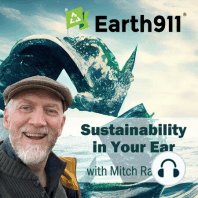56 min listen

Earth911 Podcast: Economist Ilan Noy on Hedging the Cost of Climate Risk
Earth911 Podcast: Economist Ilan Noy on Hedging the Cost of Climate Risk
ratings:
Length:
30 minutes
Released:
Nov 13, 2020
Format:
Podcast episode
Description
Extreme weather damage grows more expensive every decade. Storms, floods, droughts, and wildfire have cost the world more than $2.97 trillion dollars since 2000, according to the United Nations Office for Disaster Risk Reduction. Earth911 talks with Professor Ilan Noy, Chair in the Economics of Disasters Climate Change at Victoria University of Wellington in New Zealand about the economics of disaster and how society can make reasoned decisions when spending money to avert climate change. His recent YouTube lecture, The Economics of Disaster caught our attention.Noy discusses how insurers and government can spend now to reduce the cost of future climate-caused damage. Every decision we make about climate has an underlying economic impact, and there is no escaping the issue when choosing where we live, placing businesses, or building new infrastructure. The risk related to each our individual decisions is hedged by insurers who may begin to restrict coverage of homes in wildfire-prone regions or on coasts at risk of flooding due to sea-level rise. These companies must cover those rising costs, so insurance will become more expensive -- this may be the first direct experience many of us have of climate change. Noy shares his thinking about the distribution of risk, and how society has subsidized wealthy homeowners in areas like Marin and Sonoma County California who have lost homes to fires.We also talk about the how government can get involved to reshape risk by changing zoning rules and the scope of disaster damage recovery programs. In New Zealand, for example, banks are required to disclose the climate risks from their investments, but investors in the United States cannot check their bank's risk (though private and non-profit entities have published research on banks' undisclosed climate risk). Noy discusses the need to encourage greater transparency so people can make better decisions and how governments should begin to encourage the location of communities in areas that are not exposed to climate risk. He believes that well-informed private decisions can produce rational resutsl. And we explore a series of "Is it worthwhile to?" questions about locating homes and key infrastructure.
Released:
Nov 13, 2020
Format:
Podcast episode
Titles in the series (100)
EARTH911.com Podcast: Sustainability In Your Ear, Episode 6: This week's theme is the Circular Economy, Evelyn Lopez and the Earth911 team talk recycling swords, pet food packaging, and old deck stain and cleaners. You'll hear about Art From Scrap, a project of Santa Barbara, Calif.-based Explore Ecology that... by Earth911.com's Sustainability In Your Ear